Chittaranjan Das
Chittaranjan Das ![]()
Deshbandhu Chittaranjan Das | |
|---|---|
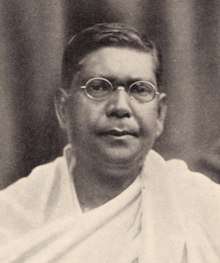 | |
| Born | 5 November 1870 Telirbagh, Dhaka, British India |
| Died | 16 June 1925 (aged 55) Darjeeling, British India |
| Nationality | Indian |
| Other names | Deshbandhu |
| Alma mater | Middle Temple |
| Occupation | Activist, lawyer |
| Political party |
|
| Movement | Anushilan Samiti Indian Independence movement |
| Spouse(s) | Basanti Devi |
| Children | 3 |
Early life
Chittaranjan Das also known as deshbandu was born in Kolkata (then Calcutta) on 5 November 1870 in a well-known Das family of Telirbagh, Bikrampur, Dhaka in Bengal, now part of Munshiganj District of Bangladesh. Bikrampur has a long historical and cultural trail since many centuries. In 12th Century it was the capital of Ballal Sena and Lakshmana Sena, Kings of Sena dynasty and since then considered as an important seat of learning and culture of Eastern India.[1]
Das family were members of Brahmo Samaj. Chittaranjan was the son of Bhuban Mohan Das, and nephew of the Brahmo social reformer Durga Mohan Das. His father was a solicitor and a journalist who edited the English church weekly, The Brahmo Public Opinion. Some of his cousins were Atul Prasad Sen, Satya Ranjan Das, Satish Ranjan Das, Sudhi Ranjan Das, Sarala Roy and Lady Abala Bose. His eldest grandson was Siddhartha Shankar Ray and his granddaughter is Justice Manjula Bose.[2]
He is generally referred to by the honorific Desh Bandhu meaning "Friend of the nation". He was closely associated with a number of literary societies and wrote poems, apart from numerous articles and essays. He married Basanti Devi (1880–1974) and had three children, Aparna Devi (1898–1972), Chiraranjan Das (1899–1928) and Kalyani Devi (1902–1983). Basanti Devi also plunged into the freedom movement and was the first woman to court arrest with her sister-in-law Urmila Devi in Non Cooperation movement in 1921. Her warmth and affection for everyone was legendary and she held the position of a matriarch in the freedom fighters fraternity. Netaji Subhas Chandra Bose used to regard her as 'Ma'.
Education
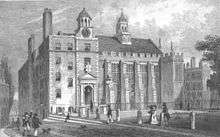
Das family of Durga Mohan was a family of lawyers. Durga Mohan's eldest son Satya Ranjan passed matriculation from Emmanuel College and was at Middle Temple during 1883–1886, followed by Chitta Ranjan Das, Durga Mohan's brother's son, during 1890–1894. Satish Ranjan Das (1891–1894), Jyotish Ranjan Das and Atul Prasad Sen (1892–1895) followed their suit.[3][4]
In London he had befriended with Sri Aurobindo Ghosh, Atul Prasad Sen and Sarojini Naidu among others, and together they promoted Dadabhai Naoroji in the British Parliament.
Career
law career
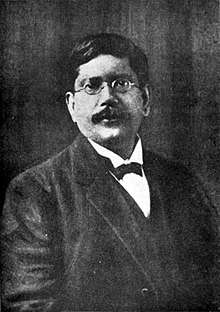
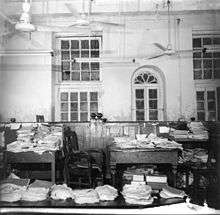
In 1894 in a stunning move Chittaranjan Das gave up his lucrative practice, and plunged headlong into politics during the non-cooperation movement against the British.[5] Chittaranjan Das again took the brief and successfully defended Aurobindo Ghosh on charges of involvement in the Alipore bomb case in 1909. In his Uttarpara speech, Sri Aurobindo gratefully acknowledged that Chittaranjan Das broke his health to save him.
In the historic trial of the Alipore bomb case in 1908, Chittaranjan Das, the defense counsel of Sri Aurobindo Ghosh, made this last statement after an eight day long deliberation:
My appeal to you therefore is that a man like this who is being charged with the offences imputed to him stands not only before the bar in this Court but stands before the bar of the High Court of History and my appeal to you is this: That long after this controversy is hushed in silence, long after this turmoil, this agitation ceases, long after he is dead and gone, he will be looked upon as the poet of patriotism, as the prophet of nationalism and the lover of humanity. Long after he is dead and gone his words will be echoed and re-echoed not only in India, but across distant seas and lands. Therefore I say that the man in his position is not only standing before the bar of this Court but before the bar of the High Court of History. The time has come for you, sir, to consider your judgment and for you, gentlemen, to consider your verdict.[6]
Political career
Chittaranjan Das was actively involved in the activities of Anushilan Samiti.[7] When Pramatha Mitter organised the Samiti as its president to produce hundreds of young firebrands who were ready to sacrifice their lives for the cause of the Nation, Chittaranjan became his associate. Anusilan Samiti was maintained by P. Mitter with the assistance of Chittaranjan Das (1894), Haridas Bose (1895), Suren Haldar (1900) and Jnanendra Nath Roy (1901).[8]
He was a leading figure in Bengal during the Non-Cooperation Movement of 1919–1922, and initiated the ban on British clothes, setting an example by burning his own European clothes and wearing Khadi clothes. At one time, his clothes were tailored and washed in Paris and he maintained a permanent laundry in Paris to ship his clothes to Calcutta. He sacrificed all this luxury when he became attached to the Freedom Movement.
He brought out a newspaper called Forward and later changed its name to Liberty to fight the British Raj. When the Calcutta Municipal Corporation was formed, he became its first mayor. He was a believer in non-violence and constitutional methods for the realisation of national independence, and advocated Hindu-Muslim unity, cooperation and communal harmony and championed the cause of national education. He resigned his presidency of the Indian National Congress at the Gaya session after losing a motion on "No Council Entry" to Gandhi's faction. He then founded the Swaraj Party, with veteran Motilal Nehru and young Hussain Shaheed Suhrawardy, in 1923, to express his uncompromising opinion and position.
His legacy was carried forward by his obedient disciple and follower Subhas Chandra Bose.
Poet
Chittaranjan Das emerged as a distinguished Bengali poet, when, during the troubled days of National movement, he published the first two volumes of his collection of poems titled "Malancha" and "Mala". In 1913 he published "Sagar Sangeet" (The Songs of the Sea). Sri Aurobindo was in Pondichery and when he was in dire need of financial support. Chittaranjan offered him one thousand rupees as a token of his support for an English translation of the poem, a few verses of which are given below:[9]
Chittaranjan started a monthly journal named Narayana, and many eminent writers such as Sharat Chandra Chattopadhyay, Bipin Chandra Pal and Hariprasad Shastri contributed their writings in the journal.[2]
Death
 Chittaranjan Das with Mahatma Gandhi and Anne Beasant at the Hill Cart Road near Kakjhora, Darjeeling in 1925
Chittaranjan Das with Mahatma Gandhi and Anne Beasant at the Hill Cart Road near Kakjhora, Darjeeling in 1925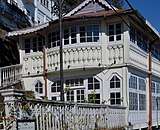 Residence of Chittaranjan Das in Darjeeling West Bengal
Residence of Chittaranjan Das in Darjeeling West Bengal- Chittaranjan's funeral procession in 1925
In 1925 Chittaranjan's health began to fail due to overwork. Chittaranjan went to Darjeeling to recuperate his health staying at Sir N. N. Sircar's house "Step Aside" in May 1925. Mahatma Gandhi visited him and stayed with him for some days. Gandhiji wrote,
"When I left Darjeeling I left much more that I had ever thought before. There was no end of my affection for Deshbandhu and my warm feeling for such a great soul."[10]
The funeral procession in Calcutta was led by Gandhi, who said:
Deshbandhu was one of the greatest of men... He dreamed... and talked of freedom of India and of nothing else... His heart knew no difference between Hindus and Mussalmans and I should like to tell Englishmen, too, that he bore no ill-will to them.[11]
Legacy
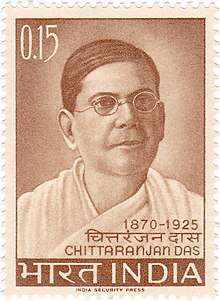
- Chittaranjan National Cancer Institute of Kolkata had its humble beginning in the year 1950 when the Chittaranjan Cancer Hospital was founded in the premises of Chittaranjan Seva Sadan. A few years before his death Chittaranjan gifted this property including his house and the adjoining lands to the nation to be used for the betterment of the lives of women.[12]
References
- Dasgupta, Hemendranath (1994), "Deshbandhu Chittaranjan Das", in Grover, Verinder (ed.), Chittaranjan Das the Deshbandu, Deep & Deep Publications, p. 224, ISBN 978-81-7100-568-0
- Sen, Rathindra Nath (1989), Life and times of Deshbandhu Chittaranjan Das, Northern Book Centre, ISBN 978-81-8511-955-7
- Sturgess, H.A.C., ed. (1949), Register of Admissions to the Honourable Society of the Middle Temple. From the Fifteenth Century to the Year 1944 – Volume II (1782–1909), London: published for the Hon. Society of the Middle Temple by Butterworth & Co.
- "Middle Temple" (PDF). hosted.law.wisc.edu. Retrieved 2 September 2017.
- Muktiprana, Parivrajika (1960), Bhagini Nividita, p. 298
- Dasgupta, Hemendranath (1994), "Deshbandhu Chittaranjan Das", in Grover, Verinder (ed.), Chittaranjan Das, Deep & Deep Publications, p. 236, ISBN 978-81-7100-568-0
- Mukhopadhyay, Haridas; Mukhopadhyay, Uma (1960), Swadeshi Andolan O Banglar Nayayug, p. 155
- Dutt, Bhupendra Nath (23 December 1960), "Viplabee Pramatha Nath", Biplabee Bangali
- Saraf, Nandini (2013), The Life and times of Deshbandhu Chittaranjan Das, Delhi: Ocean Books Pvt Ltd, ISBN 978-81-8430-213-4
- Kripalani, Sucheta (1994), "C.R. Das: Tribute to the Memory of a Great Patriot", in Grover, Verinder (ed.), Chittaranjan Das: Political Thinkers of Modern India, Deep & Deep Publications, p. 294, ISBN 978-81-7100-568-0
- Gandhi, M. K. (1924), Collected Works of Mahatma Gandhi, 27, New Delhi: Publications Division Government of India, p. 250
- "Who we are". Chittaranjan National Cancer Institute. Archived from the original on 29 September 2017. Retrieved 27 November 2011.
External links
| Wikiquote has quotations related to: Chittaranjan Das |